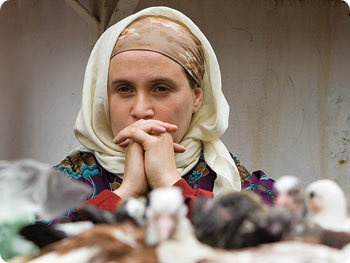Randy Alcorn's Blog, page 178
July 14, 2014
Raising Daughters Who Will Attract and Recognize the Right Kind of Men
 My wife Nanci and I raised two daughters whom I respect deeply. When the first was born the Christian doctor said to me in the delivery room, “Sorry, dad. It’s a girl.” I looked at him without appreciation and said, “I prayed we’d have a girl.” A girl was what I wanted and I’ve never had a moment’s regret that God gave me girls instead of boys. I look at Karina and Angie, now moms in their thirties, and I am delighted to see their hearts for Christ and the ways God has gifted them.
My wife Nanci and I raised two daughters whom I respect deeply. When the first was born the Christian doctor said to me in the delivery room, “Sorry, dad. It’s a girl.” I looked at him without appreciation and said, “I prayed we’d have a girl.” A girl was what I wanted and I’ve never had a moment’s regret that God gave me girls instead of boys. I look at Karina and Angie, now moms in their thirties, and I am delighted to see their hearts for Christ and the ways God has gifted them.
What a joy and privilege to have entrusted our precious daughters to the lifelong care of two godly men who seek to honor our Lord Jesus. Nanci and I couldn’t be happier with the fathers of our treasured grandsons. To have the husbands of my girls be the kind of men who honor and serve and lead them is a blessing and answer to prayer that overwhelms me at times and brings me to tears of gratitude to our Lord.
In this blog, Jen Wilkin shares some excellent thoughts on raising daughters who will attract the right kind of men:
On daughters and dating: how to intimidate suitors
I have two teen-aged daughters, so it was with some interest that I read a recent post entitled “Application to Date My Daughter”. It was pretty funny, playing on the idea of the stereotypical shotgun-toting father and the mortified daughter as they negotiate the tricky terrain of a first date. Then Christian bloggers grabbed the concept, and for the most part, these versions were funny, too. There were some common themes: slouchy-panted unemployed suitors, dads breathing out Chuck Norris-inspired threats. I didn’t lose my well-developed sense of humor until I made the tactical error of glancing at some of the comments. And then I was just flat-out sad.
Here is the comment that made me the saddest, posted by a well-meaning young Christian father:
“Bro, this is awesome. My daughter’s only 2, but I am printing this for my fridge. Thanks for your godly example.”
Oh dear.
Okay, joke’s over. Bro. Let’s talk strategy for a second. Is that all you’ve got? You need a better plan than these low-level intimidation techniques. After all, she’s your DAUGHTER, for Pete’s sake. So let’s talk frankly about what you need to do to guard her interests when it comes to dating. Instead of brandishing a shotgun or breaking out an application, you need to build a wall.
That’s right, you heard me – build a wall. Go all “Rapunzel”. Build it so high that only the strongest of suitors can scale it. But don’t wait until your baby girl is a teenager, Bro – start now. Start yesterday. There’s no time to waste.
Build a wall
In Song of Solomon 8:8-9 we hear a family’s hope that their young sister will grow into a woman of strength and dignity. Can you guess what metaphor they use to describe that kind of woman? A wall. Their sister assures them in verse 10 that she is indeed a wall, complete with towers. Her statement indicates an assurance that she is not only strong, but able to defend herself against any unworthy suitors. That’s what you want, Bro – you want a wall.
Here’s the problem with shotgun jokes and applications posted on the fridge: to anyone paying attention, they announce that you fully expect your daughter to have poor judgment. Be assured that your daughter is paying attention. And don’t be shocked if she meets your expectation. You might want to worry less about terrorizing or retro-fitting prospective suitors and worry more about preparing your daughter to choose wisely. And that means building a wall.
Instead of intimidating all your daughter’s potential suitors, raise a daughter who intimidates them just fine on her own. Because, you know what’s intimidating? Strength and dignity. Deep faith. Self-assuredness. Wisdom. Kindness. Humility. Industriousness. Those are the bricks that build the wall that withstands the advances of old Slouchy-Pants, whether you ever show up with your Winchester locked and loaded or not. The unsuitable suitor finds nothing more terrifying than a woman who knows her worth to God and to her family.

Each blog regularly appears on my Facebook page where people often comment on it. If you’d like to comment or see others’ comments, we invite you to join us there.
July 11, 2014
Remembering Our Brothers and Sisters in Christ in North Korea
 The EPM office had a visit in May from Pastor Eric Foley and Pastor Tim Dillmuth, who are both with the nonprofit Seoul USA. This ministry works to mobilize western and Asian churches to remember the underground church of North Korea. What an eye-opening opportunity for EPM’s staff to learn about North Korean Christians and correct some of the misconceptions we have on how to best minister to them!
The EPM office had a visit in May from Pastor Eric Foley and Pastor Tim Dillmuth, who are both with the nonprofit Seoul USA. This ministry works to mobilize western and Asian churches to remember the underground church of North Korea. What an eye-opening opportunity for EPM’s staff to learn about North Korean Christians and correct some of the misconceptions we have on how to best minister to them!
Our visitors shared that when North Korean believers are asked how we in the West can pray for them, they often respond by explaining they pray for us! When asked why, they say, “You place a lot of faith in your money and freedom. We have neither money nor freedom. We have God, and that is enough.”
Pastor Foley writes, "We Western Christians are tempted or deceived into confusing God with Mammon, and freedom of religion with freedom in Christ. North Korean Christians see daily the stark difference between the One True God and every counterfeit. They talk of a freedom that can’t be taken away, even inside a concentration camp."
Why Persecution of North Korean Underground Christians Will Likely Worsen
With North Korea continuing its twelve year run as number one on the World Watch list of most persecuting countries on earth for Christians, it is hard to imagine that life could get any harder for North Korean underground believers. But new guidelines released earlier this year by the North Korea’s Ministry of People’s Security order a crackdown on “superstitious behavior,” which likely means increased surveillance and even greater punishment for North Korean Christians.
What would it look like for Christian persecution to increase in already Christian-hostile North Korea?
Our best estimates are that one third of North Korea’s 100,000 underground Christians are in concentration camps. But that means two thirds have so far managed to avoid detection by the state. Some of those would be believers who have been protected because of their high position in the government or their family history. The 2013 execution of Jang Song Taek, Kim Jong Un's uncle, shows that position or blood will no longer exempt anyone from punishment.
North Korean Christians would not want us to pity them as these new guidelines go into effect. In fact, they regularly tell us not to pray for them but instead to pray with them—that God will empower us both to be faithful in whatever circumstances he places us. Money and “pity prayer” can’t solve these problems. Instead, we need a willingness to share their stories, share their sufferings, emulate them in our own Christian lives, and support them as they reach their fellow North Koreans for Christ.
—Eric Foley, Seoul USA
Learn more about Seoul USA and North Korean Christians. You can sign up to receive email updates on how to pray for the underground church of North Korea.
Stephanie Anderson
Eternal Perspective Ministries
July 9, 2014
Dispatches from the Front
 I recently viewed two episodes of “Dispatches from the Front,” a DVD series produced by Frontline Missions and thought they were excellent. These documentaries show our brothers and sisters in Christ at work in remote and dangerous places of the world.
I recently viewed two episodes of “Dispatches from the Front,” a DVD series produced by Frontline Missions and thought they were excellent. These documentaries show our brothers and sisters in Christ at work in remote and dangerous places of the world.
My assistant Kathy and her husband viewed all six episodes and loved each one: “Executive Producer Tim Keesee is a gifted writer who keeps you captivated with his visible journaling throughout the trips. The courage of these believers and their love for God is very inspiring. These would be a great resource for summer family viewing to share with your kids how God’s word is being spread and give them a heart for missions.”
Check out this trailer from episode 4:
“…you will be my witnesses in Jerusalem and in all Judea and Samaria, and to the end of the earth” (Acts 1:8).
(Tim's new book, also called Dispatches from the Front, is a companion to the DVDs and shows the Gospel's advance in the world's difficult places.)

Each blog regularly appears on my Facebook page where people often comment on it. If you’d like to comment or see others’ comments, we invite you to join us there.
July 7, 2014
Forsaken Faith
 The percentage of college students today who grow up in Christian homes and later turn their backs on Christ is stunning, almost beyond belief. I believe it’s vital that parents and church leaders understand some of the major reasons behind this trend—and know what they can do now to help their children prepare for the challenges ahead.
The percentage of college students today who grow up in Christian homes and later turn their backs on Christ is stunning, almost beyond belief. I believe it’s vital that parents and church leaders understand some of the major reasons behind this trend—and know what they can do now to help their children prepare for the challenges ahead.
Issue #1: The Problem of Evil and Suffering
Many times the faith of students from Christian families is shaken because they have professors who argue, “Well, if you were in charge of the universe and all powerful, would you allow children to starve and be raped? I would think not.” As a young believer, C. S. Lewis was the first one to help me grapple with big and difficult questions like these. In The Problem of Pain, he described how he himself used to argue against the Christian faith:
Not many years ago when I was an atheist, if anyone had asked me, “Why do you not believe in God?” my reply would have [been]: “Look at the universe we live in.”...History is largely a record of crime, war, disease, and terror.... the universe… is running down.... All stories will come to nothing: all life will turn out in the end to have been a transitory and senseless contortion upon the idiotic face of infinite matter. If you ask me to believe that this is the work of a benevolent and omnipotent spirit, I reply that all the evidence points in the opposite direction. Either there is no spirit behind the universe, or else a spirit indifferent to good and evil, or else an evil spirit.
Has Richard Dawkins or any atheist ever stated it more clearly? I love that Lewis articulated the problem of evil and suffering better than most atheists. Yet he embraced a biblical worldview which had a far greater explanatory power than his atheism. And he passed it on to me. (Let’s feed our children C. S. Lewis on evil and suffering before they hear the rants of atheist and agnostic college professors, most of them intellectual pygmies compared to Lewis.)
In light of the great number of young people who go to college intellectually unprepared for what they’ll face, and ultimately reject their faith, we need to ask ourselves two questions: What are we doing to help nominally Christian young people come to a true faith in Christ? And what are we doing to help youthful genuine Christians go deeper in exploring Scripture, learning sound theology, and developing a truly Christian worldview, not a superficial one?
We need to teach our children to be readers and students of God’s Word. If I am biblically grounded I can read the Book of Mormon and a book by the Dalai Lama and evaluate it appropriately. If I’m not, by reading such things I run the risk of believing untruths and being sucked into anti-Christian heresy.
This is why so many Christian young people “lose their faith” in both secular and Christian colleges. Being insufficiently trained in the Scriptures, they fail to screen out what their professors and textbooks and peers are saying (and how they are living). They absorb and end up adopting from the college a false worldview, usually a specifically anti-Christian worldview. Some reject their faith entirely and seldom come back to church, but many more become nominal Christians who have adopted a worldview that overshadows and undermines their faith—even if they remain church-goers.
 Let’s not leave it to the world to ask the hard questions. Let the church lead the way. The Bible raises these very questions—including “How Long O Lord?”—and answers them better than any other worldview. The church can play a critical role in helping young people prepare for what they’ll hear and face in college. (However, too often youth pastors get the blame for students whose parents expect the church to “fix” their kids. Unfortunately, speaking as both a parent and a former youth pastor, it isn’t that easy. The church can and should be a source of guidance and support for parents. But no youth group is a substitute for attentive, hands-on parenting.)
Let’s not leave it to the world to ask the hard questions. Let the church lead the way. The Bible raises these very questions—including “How Long O Lord?”—and answers them better than any other worldview. The church can play a critical role in helping young people prepare for what they’ll hear and face in college. (However, too often youth pastors get the blame for students whose parents expect the church to “fix” their kids. Unfortunately, speaking as both a parent and a former youth pastor, it isn’t that easy. The church can and should be a source of guidance and support for parents. But no youth group is a substitute for attentive, hands-on parenting.)
I believe we as parents and grandparents need to teach our children that it’s okay to explore difficult, theology-stretching issues. Don’t wait until they get to a secular high school or off to college to hear them discussed! Bring them up. Say, “Let’s talk about the fact that there’s a lot of evil and suffering in this world. Why do you think God allows all that? God’s all powerful. Why does He allow these things to happen?”
After being raised in a non-Christian home, I’m convinced the Christian worldview has a greater explanatory power than any other worldview. (And everyone, by the way, has a worldview.) So encourage your kids to come to grips with the Christian worldview—so it’s not your worldview they’re just automatically accepting, until one day they’re challenged and reject it because they didn’t have any basis for their own worldview.
Instead, help them look at what the Bible says. Encourage their questions, and then go and read good books yourself. Bring valuable insights to them to help them understand the Christian faith and Lord willing, to own their faith for themselves.
Issue #2: The Problem of Sexual Impurity
However, I don’t believe that the problem of evil and suffering is the only reason young people are losing their faith. Many times, they go off to college and are surrounded by immorality, where you’re strange if you’re not sleeping with someone or watching pornography. Often their roommates are viewing porn, and so pretty soon they’re going down that path too.
And once they've begun practicing sexual immorality, the only way to resolve their guilt problem is either to confess and repent, or to disbelieve—to no longer embrace the worldview where there is a God who is our Judge and has moral standards we’re accountable to. It is very convenient for someone to reject faith and say it’s for intellectual reasons, when it's actually for moral reasons.
Again, parents need to lead the way by teaching and modeling purity in the home before their children reach adulthood. Train your children in choice and consequence, wisdom and foolishness, as exemplified in Proverbs. Teach them to love righteousness and hate sin (see Psalm 97:10). Teach them self-control—the ability to say no in other areas will carry over to sexual purity.
Parents should exercise gracious but firm control over their children’s friendships and media habits. We should avoid a double standard that says children shouldn’t watch impure programs on television, but it’s okay for adults.
Protect your children. Would any thinking parents pile a stack of pornographic magazines in their son’s bedroom closet, then tell him, “We trust you not to look at them”? This is what we do when we allow him a computer with nternet access in his bedroom.
Every child receives a sex education. The only questions are: (1) When? (2) Where? (3) From whom? Parents should be their ultimate sex educators. Speak to your children about sex in age-appropriate ways not just as biology, but in the context of values, responsibility, and marriage.
If anyone else is teaching your children about sex, find out exactly what’s being said.
And teach and model modesty in the home. Where else will your children learn it?
Asking the Tough Questions
 I realize this will offend some, but to be completely honest, I think no Christian young person should be sent to a secular college—or for that matter many “Christian” colleges—unless he is exceptionally knowledgeable of the Scriptures, is leading a strong Christian life and knows how to resist peer pressure and temptation to experiment with sex and drugs.
I realize this will offend some, but to be completely honest, I think no Christian young person should be sent to a secular college—or for that matter many “Christian” colleges—unless he is exceptionally knowledgeable of the Scriptures, is leading a strong Christian life and knows how to resist peer pressure and temptation to experiment with sex and drugs.
If he’s not prepared to question his professors and if he may give in to their skepticism and attacks on the Christian faith, he does not belong there. If we want our children to lose their faith, there are less expensive ways to help them do that! (I’m being deliberately sarcastic to make an important point.)
If your child is going to a secular college or a Christian college that doesn’t adhere to the authority of the Scriptures, is he/she mature enough to face the worldly temptations as well as the intellectual challenges to his faith? These are tough questions that need to be asked before your student steps foot in a college classroom. I highly recommend every parent read, and then discuss with their kids, J. Budziszewski’s book How to Stay Christian in College and University of Destruction: Your Game Plan For Spiritual Victory on Campus by David Wheaton. I also recommend Preparing Your Teens for College by Alex Chediak.
May we lead the way in teaching and training our children and grandchildren to follow Christ. And may we prepare them intellectually and morally for the world they’ll face as adults.
Don’t let anyone look down on you because you are young, but set an example for the believers in speech, in conduct, in love, in faith and in purity. (1 Timothy 4:12, NIV)
But as for you, O man of God, flee these things. Pursue righteousness, godliness, faith, love, steadfastness, gentleness. Fight the good fight of the faith. (1 Timothy 6:11-12)

Each blog regularly appears on my Facebook page where people often comment on it. If you’d like to comment or see others’ comments, we invite you to join us there.
This article is featured in the new summer issue of our Eternal Perspectives magazine.
This issue also includes "Setting Your Mind on Things Above This Summer" by John Piper, "Would a Good Steward Spend Money on a Vacation?", and more. (Plus, don’t miss the special promotion code for readers!)
Read the magazine online (you can also sign up to regularly receive it)
Stock image credits: college campus | lecture hall
July 4, 2014
Thinking of Retirement as the Next Opportunity to Serve Christ
 When it comes to the “retirement dream,” we must ask, “Whose dream is it?” It may be the American dream—but is it God’s? For some people, retirement has replaced the return of Christ as the “blessed hope,” the major future event that we anticipate. (Try doing a Bible study on the subject of retirement—I guarantee you, it won’t take long!)
When it comes to the “retirement dream,” we must ask, “Whose dream is it?” It may be the American dream—but is it God’s? For some people, retirement has replaced the return of Christ as the “blessed hope,” the major future event that we anticipate. (Try doing a Bible study on the subject of retirement—I guarantee you, it won’t take long!)
When a man retires at sixty-five, studies show his chances of having a fatal heart attack immediately double. Our minds and bodies weren’t made for an arbitrary day of shutdown. Nowhere in Scripture do we see God calling healthy people to stop working. Of course, it’s perfectly legitimate to work without pay. It’s your option to give labor to ministry and volunteer work rather than to your present job. But as long as God has us in this world, He has work for us to do. The hours may be shorter, the work different, the pay lower or nonexistent. But He doesn’t want us to take still productive minds and bodies and permanently lay them on a beach, lose them on a golf course, or lock them in a dark living room watching game shows.
If you’ve saved for retirement and no longer need to work for pay, then donate your time working for the church, the poor or underprivileged children. And don’t forget the great opportunity you have to become a self-supported missionary for two or five or ten or twenty years. If you’re still here, God isn’t done with you. In fact, your most fruitful years of ministry may be ahead. That’s true whether you’re in a retirement home or anywhere else. God has a unique ministry for you here and now. Don’t kill time, any more than you would burn money. Instead, invest it in eternity.
John Piper has done much to address this topic. In this excellent video, he reads his poem “Pilgrim’s Conflict with Sloth,” and candidly and honestly struggles with his transition into what is commonly called retirement:
Below are excerpts from John’s book Rethinking Retirement, which you can read online for free:
There are different ways of dying. And there are different ways of living just before we die. But for the Christian, all of them—the final living and the dying—are supposed to make God look glorious. All of them are supposed to show that Christ—not this world—is our supreme Treasure.
So finishing life to the glory of Christ means using whatever strength and eyesight and hearing and mobility and resources we have left to treasure Christ and in that joy to serve people—that is, to seek to bring them with us into the everlasting enjoyment of Christ. Serving people, and not ourselves, as the overflow of treasuring Christ makes Christ look great.
…Finishing life to the glory of Christ means resolutely resisting the typical American dream of retirement. It means being so satisfied with all that God promises to be for us in Christ that we are set free from the cravings that create so much emptiness and uselessness in retirement.
…If we are going to make Christ look glorious in the last years of our lives, we must be satisfied in him. He must be our Treasure. And the life that we live must flow from this all-satisfying Christ. And the life that flows from the soul that lives on Jesus is a life of love and service. This is what will make Christ look great. When our hearts find their rest in Christ, we stop using other people to meet our needs, and instead we make ourselves servants to meet their needs. This is so contrary to the unregenerate human heart that it stands out as something beautiful to be followed or something convicting to be crucified.

Each blog regularly appears on my Facebook page where people often comment on it. If you’d like to comment or see others’ comments, we invite you to join us there.
This article is featured in the new summer issue of our Eternal Perspectives magazine.
This issue also includes "Setting Your Mind on Things Above This Summer" by John Piper, "Would a Good Steward Spend Money on a Vacation?", and more. (Plus, don’t miss the special promotion code for readers!)
Read the magazine online (you can also sign up to regularly receive it)
July 2, 2014
How should we view and respond to people of different religions?
 First of all, we view them as created in the image of God, valuable, precious in God’s sight, and therefore they should be precious in our sight. We should treat everyone with respect. As a matter of fact, even if we have an enemy and that person was attacking us, Jesus said, “Love your enemies, do good to those who hate you” (Luke 6:27). (And I don’t regard people of other faiths as enemies.)
First of all, we view them as created in the image of God, valuable, precious in God’s sight, and therefore they should be precious in our sight. We should treat everyone with respect. As a matter of fact, even if we have an enemy and that person was attacking us, Jesus said, “Love your enemies, do good to those who hate you” (Luke 6:27). (And I don’t regard people of other faiths as enemies.)
Clearly we should have respect, love, kindness, mercy, grace, all of those things, toward others. There are very honest differences between people of different belief systems. So it doesn’t mean we are going to agree on everything. Clearly we are not going to agree on everything! But I think we need to disagree with grace and respect. Just because we don’t believe the same thing doesn’t mean we should have an antagonistic attitude toward other people.
However, as Christians, to be understanding and tolerant of other people also coincides with our need to be faithful to what we believe is true. So I can believe that somebody without Jesus Christ is actually going to Hell for eternity (Matthew 25:46), but still love that person and respectfully disagree with their belief system. I also need to be willing to protect them from harm, die for them, speak the gospel truth in love, and do all that I can to show them the love of Jesus. All of that fits together.

Each blog regularly appears on my Facebook page where people often comment on it. If you’d like to comment or see others’ comments, we invite you to join us there.
This article is featured in the new summer issue of our Eternal Perspectives magazine.
This issue also includes "Setting Your Mind on Things Above This Summer" by John Piper, "Would a Good Steward Spend Money on a Vacation?", and more. (Plus, don’t miss the special promotion code for readers!)
Read the magazine online (you can also sign up to regularly receive it)
June 30, 2014
5 Reasons to Rejoice, Not Worry
 Just after instructing us to rejoice in the Lord (Philippians 4:4), Paul wrote in verse 6, “Do not be anxious about anything.” Worry is a kill-joy. It specializes in worst case scenarios when God promises us best case scenarios:
Just after instructing us to rejoice in the Lord (Philippians 4:4), Paul wrote in verse 6, “Do not be anxious about anything.” Worry is a kill-joy. It specializes in worst case scenarios when God promises us best case scenarios:
1. He has already rescued us from the worst, which is eternal Hell;
2. Even if something horrible happens, He will use it for our eternal good (Romans 8:28);
3. Often bad things do not happen and our worry proves groundless;
4. Whether or not bad things happen, our worry generates no positive change, and in fact, can cause me great harm;
5. The cause for all our worries—sin and the Curse—is temporary, and will soon be behind us. Forever.
Hence the command to rejoice is not mere positive thinking—we have every reason to rejoice.
Paul continued in verse 7, “But in everything by prayer and supplication with thanksgiving let your requests be made known to God. And the peace of God, which surpasses all understanding, will guard your hearts and your minds in Christ Jesus.” Instead of worrying, we’re to take our concerns to God, choosing to thank Him as we do—for His goodness, His sovereignty and His promises to work everything for good.
In verse 8 Paul said: “Finally, brothers, whatever is true, whatever is honorable, whatever is just, whatever is pure, whatever is lovely, whatever is commendable, if there is any excellence, if there is anything worthy of praise, think about these things.”
Thought is a choice. We often imagine, “I have no control over what I think about.” Martin Luther is credited with responding, “You can’t stop the birds from flying over your head, but you can keep them from making a nest in your hair.” What we choose to think about becomes our master.
Some believers become obsessed with everything that’s wrong with the world. We are continually bombarded by “news” (sometimes more sensational than informative) that dwells on the sufferings, tragedies and crises of life. It is easy for this unceasing avalanche of “bad news” to bury the Good News.
I do not favor living in a cave, denying suffering and trying to be “blissfully ignorant” of the world’s woes. Rather, Paul said, we are to focus our thoughts on the true eternal realities God affirms, that better empower us to rejoice.
Remembering God’s presence, praying and feeding our thoughts with good things that honor our King—these will increase our joy while starving our anxiety.

Each blog regularly appears on my Facebook page where people often comment on it. If you’d like to comment or see others’ comments, we invite you to join us there.
This article is featured in the new summer issue of our Eternal Perspectives magazine.
This issue also includes "Setting Your Mind on Things Above This Summer" by John Piper, "Would a Good Steward Spend Money on a Vacation?", and more. (Plus, don’t miss the special promotion code for readers!)
Read the magazine online (you can also sign up to regularly receive it)
June 27, 2014
Scott Hamilton on Success, Cancer, and Faith

Many of us see Olympic Gold Medalist Scott Hamilton for a week or so every four years, during the winter Olympics, when he’s covering ice skating. I found his ten minute story of success, loss, cancer and turning to God to be engaging and encouraging.
(For those in the Portland, Oregon area who are interested, Scott is coming in October to speak at Adventist Health’s Heroes of the Heart Gala.)

Each blog regularly appears on my Facebook page where people often comment on it. If you’d like to comment or see others’ comments, we invite you to join us there.
June 25, 2014
Sidewalk Counseling, a Life Saved, and a Family Brought the Gospel
 I love this prolife story. It testifies to the ways God can use believers peacefully praying, holding signs, and sharing prolife information as well as the gospel, outside an abortion clinic.
I love this prolife story. It testifies to the ways God can use believers peacefully praying, holding signs, and sharing prolife information as well as the gospel, outside an abortion clinic.
When people see you standing up for what you believe, those with hard hearts resent you. But those whose hearts are being softened by God’s Spirit are interested and will genuinely listen. They will often be open not just when you talk about the unborn, but when you talk about Christ.
Denny Hartford, director of Vital Signs Ministries, writes: “Does prayer at the abortion centers and sidewalk counseling matter? You better believe it! From testimonies received over the years (including from former abortionists), we are convinced that God is accomplishing great things by our peaceful, prayerful presence at the abortion clinics.”
Of course, it’s not that prolifers only pray and intervene, and don’t provide further follow-up or help for mothers who decide to keep their babies. As this story demonstrates, the law of love will also motivate us to provide money, housing, baby clothes, adoption services, legal help, counseling and a myriad of other forms of support to the pregnant woman. Love will compel us to share the gospel with her.
Baby Saved From Late-Term Abortion When Car Dies on the Way to the Clinic
by Steven Ertelt
Anyone involved in the pro-life movement has seen a myriad of reasons why women change their mind about having an abortion. But this may be the first time a couple considering an abortion have changed their mind because their car died.
Baby Roman was 18 weeks along when his parents went to Planned Parenthood last July for an abortion. They were told Roman was too late in pregnancy to be legally killed in an abortion and were directed to an abortion clinic in New Jersey that does late-term abortions.
But, in a chain of events that the couple describe as a miraculous sign from God, their car died. Because pro-life sidewalk counselors were on hand to assist them, they chose life for little Roman. Christian News Network has the rest of the story.

Each blog regularly appears on my Facebook page where people often comment on it. If you’d like to comment or see others’ comments, we invite you to join us there.
June 23, 2014
The Eternal Empire of the Son of Man
 It’s a common but serious mistake to spiritualize the eternal Kingdom of God. But consider Daniel 7, where we’re given a prophetic revelation of four earthly kingdoms, beginning with Nebuchadnezzar’s Babylon, that will one day be forever replaced by a fifth kingdom. “There before me was one like a son of man, coming with the clouds of heaven. He approached the Ancient of Days and was led into his presence. He was given authority, glory and sovereign power; all peoples, nations and men of every language worshiped him. His dominion is an everlasting dominion that will not pass away, and his kingdom is one that will never be destroyed” (Daniel 7:13-14).
It’s a common but serious mistake to spiritualize the eternal Kingdom of God. But consider Daniel 7, where we’re given a prophetic revelation of four earthly kingdoms, beginning with Nebuchadnezzar’s Babylon, that will one day be forever replaced by a fifth kingdom. “There before me was one like a son of man, coming with the clouds of heaven. He approached the Ancient of Days and was led into his presence. He was given authority, glory and sovereign power; all peoples, nations and men of every language worshiped him. His dominion is an everlasting dominion that will not pass away, and his kingdom is one that will never be destroyed” (Daniel 7:13-14).
In contrast to the tenuous and temporary rule of the nations, we’re told that the Messiah’s dominion—in context, a kingdom on Earth—will be “everlasting” and “will not pass away” and “will never be destroyed” (v. 14). Christ will not merely destroy the earth where fallen kings once ruled. Rather, He will rule over the same Earth, transformed and new.
At Daniel’s request, an angel provides an interpretation of his vision: “The four great beasts are four kingdoms that will rise from the earth” (v. 17). Then the angel makes an extraordinary statement: “But the saints of the Most High will receive the kingdom and will possess it forever—yes, for ever and ever” (v. 18). This statement makes clear both the kingdom’s location (Earth) and its duration (eternal).
God has never abandoned His original plan that righteous human beings will inhabit and rule the earth. That’s not merely an argument from silence. Daniel 7:18 explicitly reveals that “the saints of the Most High will receive the kingdom and will possess it forever.” What is “the kingdom”? Earth.
Earth is unique. It’s the one planet—perhaps among billions—where God chose to act out the unfolding drama of redemption and reveal the wonders of His grace. It’s on the New Earth, the capital planet of the new universe, that He will establish an eternal Kingdom.
I share more in this video (kindly animated by the staff at Clarion Creative):

Each blog regularly appears on my Facebook page where people often comment on it. If you’d like to comment or see others’ comments, we invite you to join us there.
photo credit: seyed mostafa zamani via photopin cc | rounded corners added from original



